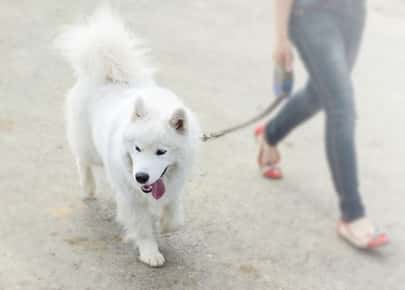
Have you ever tried to walk across the beach barefoot on a very hot day? After the first few steps, you probably set a new speed record as you sprinted to the water, or maybe you gave in and put on your sandals before taking another step. Your pet experiences the same reaction during summer walks on the sidewalk or road. Despite the common belief that paw pads provide the ultimate protection for your furry friend, your pet's feet are vulnerable.
Your Pet’s Built-In Shoes
Paw pads protect your pet's feet just as your shoes protect your feet. They provide traction and act as shock absorbers when your pet jumps and runs. Walking over sticks and rocks isn't uncomfortable for your dog or cat because the pads distribute weight very effectively over the entire surface of the pad, minimizing discomfort. Although your pet's paws are very tough, they can be injured by sharp objects or exposure to hot or cold temperatures.
It's Hotter Than You Think
Concrete and asphalt heat up quickly. On average, these surfaces are 40 to 50 degrees higher than the air temperature. On a 90-degree-day, the temperature of the sidewalk may reach a sizzling 130 degrees. Concrete and asphalt tend to retain heat for hours. Even when temperatures start to drop, it's still may not be safe to walk your pet. Although both dogs and cats can experience pad burns, the problem is more common in dogs, as most cats don't spend time going for walks on a leash.
Not Just Pavement
Burns can also occur when your dog walks on the sand or is exposed to hot metal or other hot surfaces on a car or truck. Even riding in the seat of a car that's been sitting in the sun for hours can cause burns.
Take the Test
One simple test makes it easy to determine if it's too hot to take your dog for a walk. Place your hand on the concrete and asphalt for at least 10 seconds. If you find it hard to keep your hand on the pavement, it's best to skip the walk or delay it.
Pay Attention to Your Dog's Behavior
Dogs want to please their owners and may continue to walk even if they are very uncomfortable. When the street or on the sidewalk is just too hot, your dog may:
- Hop from foot to foot to limit contact with the pavement
- Head toward the grassy area between the street and sidewalk
- Refuse to continue walking after touching a hot surface
Signs of a Burn
If your dog experiences a burn, you may notice:
- White spots or blisters on the paws
- Redness or darkening of the pads
- Chewing or licking the paws
- A missing part of the pad
- Limping
How to Prevent Burns and Overheating
Avoiding walking your dog on concrete, asphalt or other hot surfaces is the best way to prevent burns, but there are a few other things you can do to prevent burns and overheating. These tips will help your pet stay safe when the temperatures soar:
- Walk your dog on concrete when temperatures are cooler to build up calluses. Calluses provide a little extra protection from temperature extremes.
- Take walks on grassy surfaces when the pavement is too hot.
- Bring your pet inside when the heat and humidity rises to unsafe levels. Turn on the air-conditioning or use plenty of fans on hot, humid days to prevent heat stroke.
- Offer plenty of water on hot days.
- Don't leave your pet in the car. The temperature in a vehicle can become dangerously high in as little as 10 minutes, even if you keep the car window slightly open.
- Turn on the air-conditioning in your vehicle and let it run for several minutes before you or your pets enter.
- Place a blanket or towel on hot car seats to protect your pet from burns.
- Buy dog booties or socks to protect your pet's feet if walking on asphalt or cement is unavoidable.
What to Do if Your Pet Experiences a Burn
Use cool water to clean off the pads and apply an antibacterial cream or ointment. Place gauze or a bandage over the burns and make an appointment with your pet's veterinarian as soon as possible. If you're concerned that your pet may have experienced paw pad burns, or it's time for your furry friend's checkup, give us a call. We're committed to providing excellent healthcare for your pets.
Sources:
PetMD: If You Can’t Stand the Heat, 07/28/11
http://www.petmd.com/blogs/fullyvetted/2011/july/burnt_pad_denial_in_dogs-11436
Pet Sitters: How Hot is That Sidewalk?
http://www.petsitters.org/docs/How%20Hot%20is%20That%20Sidewalk.pdf
American Kennel Club Canine Health Foundation: Keeping Dogs’ Paws Healthy, 11/19/12
